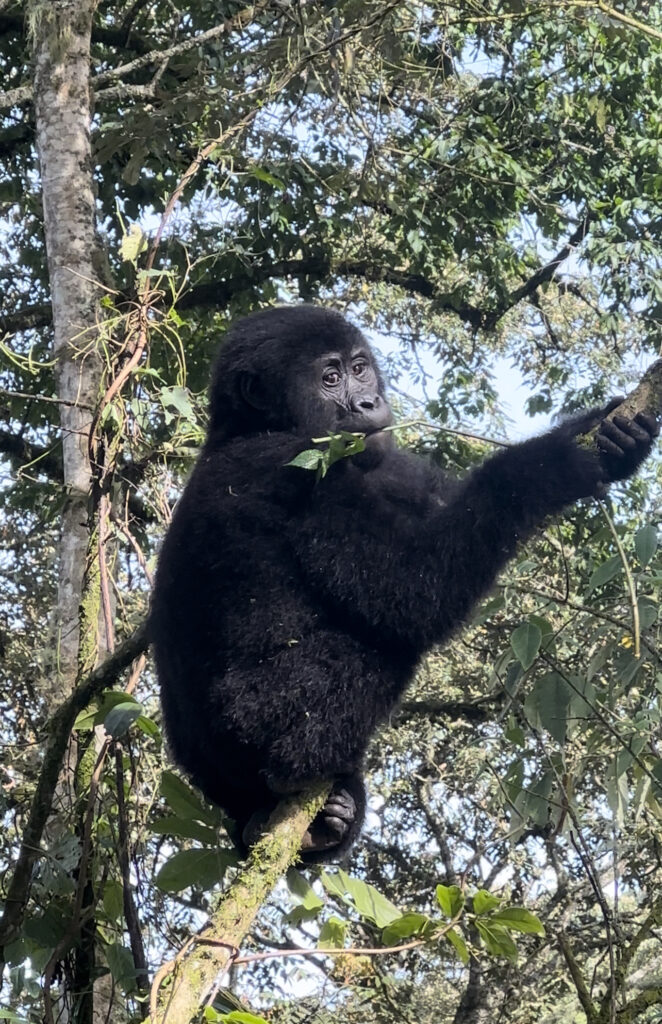By Daudi Mutalya Balye – Chief Exploring Officer Buutu Safaris

Yes, a resounding yes. Gorilla trekking based conservation was created as an African centric solution with conservation and poverty alleviation as top priorities. Its success over the last ten years provides a good template for responsible tourism as it has demonstrated how inclusive travel can help in fighting poverty in Africa.
In the 1990s, the government of Uganda responded to the dire mountain gorilla crisis by creating Bwindi Impenetrable National Park and Mgahinga National Park in the south west of the country. Similarly, Rwanda government created Volcanoes National Park which sits on the border with Uganda and shares an eco-system with Mgahinga National Park. These three parks created a safe haven for mountain gorillas as habitat loss was stopped and poaching reduced.
The governments acknowledged that to conserve the unique forest habitat, the mountain gorillas and other fauna, they had to address the poverty question which precipitated human gorilla conflict. Gorilla trekking was the innovative solution that was created to conserve the forest while enabling Ugandans and Rwandans rise from poverty.
To ensure conservation was aligned to needs of the communities, the government put in place a revenue sharing scheme where 20% of the revenue from gorilla trekking was shared with the local communities. On our visit to Rushaga village in Bwindi last year, we witnessed the revenue sharing as members of Rushaga community received cows from their portion of the revenue they received.
The government effort also created direct employment for marginalised youth who previously engaged in poaching wildlife. As safari lodges opened to accommodate tourists around the national parks, more opportunities were created for Africans in the hospitality sector.As the tourist numbers increased, more opportunities were created in birding and guiding, arts and crafts and for traditional experiences like local gin brewing arose.
The evidence of the success is best seen in the attitude change towards gorillas. There are no fences around the gorilla forest but the communities are now the zealous protectors of the forest. Communities are the intelligence network and work diligently with the authorities to protect the forest and gorillas. Mountain gorillas are now revered in these communities. In Rwanda, the fanfare at the baby gorilla naming ceremony “Kwita Izina ” of new gorillas attests to the intimate connection gorillas have taken in society.
Gorilla trekking has saved gorillas from extinction, enabled thousands rise from poverty and improved independence of African countries by providing much needed non AID revenue. Gorilla trekking has spurred conservation based economy inone of the most unique ecological areas. Thousands of visits every year make it possible to conserve the unique gorilla ecosystem and the mountain gorillas. The gorilla conservation model prioritizes the wellbeing of Ugandans and Rwandans living on margins by creating employment and important opportunities for artisans and dancers especially for women and youth.
Gorilla trekking is probably one of the most successful conservation project in Africa in the last 20 years thanks to the efforts of UWA and RWA. Gorilla trekking conservation gives insights into how humanity can create green sustainable economy.
Having said that, the authorities need to limit the numbers of trekkers per day which means the price needs to rise further. Less number of visitors will cause no distress to gorillas, or damage to their environment. There are various studies have highlighted the contribution of the revenue sharing scheme in Bwindi Impenetrable Forest National Park communities.
There is also the persistent question of the Batwa families who have remained inpoverty despite numerous government interventions to compensate them for their displacement during the creation of national parks. The main reasons for the failure remain a lack of coordination between government and private organizations; unscrupulous Ugandans and Rwandans who use Batwa plight to profit, rampant alcoholism and family breakdown in Batwa.
Responsible tourism is key to conservation of these habituated animals. Strict adherence to standard protocols set in place, and limiting the number of visitors will create a viable sustainable green economy.
We excel at creating unique gorilla trekking and big game encounters in the African wilderness